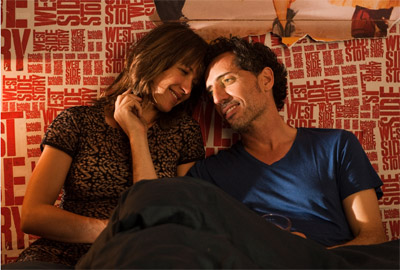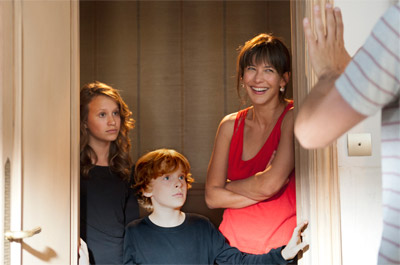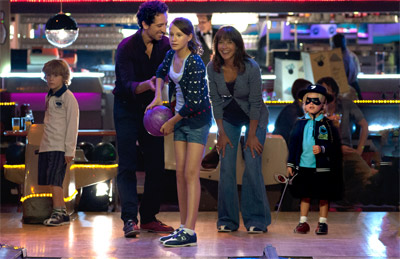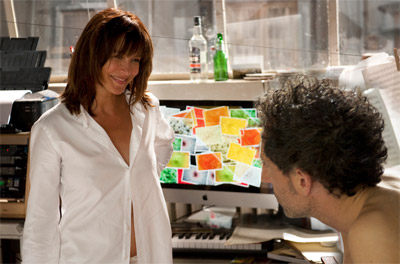Sophie Marceau Happiness Never Comes Alone Interview

Sophie Marceau Happiness Never Comes Alone Interview
Cast: Sophie Marceau, Gad Elmaleh
Director: James Huth
Genre: Comedy, Romance
Rated: M
Running Time: 105 minutes
Synopsis: Sacha likes his friends, his piano and partying. He spends his evenings playing in a jazz club where he seduces pretty girls. He is happy and free as the wind, living the thrill of the moment. No alarm clock, no wedding ring, no taxes.
Charlotte has three children, two ex-husbands and a career to manage. She doesn't have any space for romance in her life.
They are poles apart and have nothing in common...
But they are made for one another.
Happiness Never Comes Alone
Release Date: May 30th, 2013
Interview with Sophie Marceau
Question: When James Huth talked to you about this project for a romantic comedy, how did you react?
Sophie Marceau: I really like James and his somewhat madcap films. He has a fantasy side and lots of energy. His project had some genuine artistic qualities; it wasn't just a nice, feel-good story. But I told James it was all about finding the right partner. Everything depended on that relationship. And I don't know why, but it's not always easy to 'marry" me on film. We discussed certain actors who are very good, but when he mentioned Gad, I didn't hesitate for a second. It had to be him.
Question: Did you know him already?
Sophie Marceau: Not at all. I'd watched his sketches with my son, but even without knowing him, I felt as though we belonged to the same family. His way of observing people, his stage work, his sense of humour, which is neither mocking nor cynical – I liked the humanity in his observations.
Question: What were your initial meetings like?
Sophie Marceau: Gad is quite reserved; he observes, and so do I. Initially, I even thought he was a bit wary of me. But that didn't last long and we soon got a connection going.
Question: As a spectator, do you like romantic comedies?
Sophie Marceau: Yes, I find anything that deals with human nature and relationships between people fascinating – especially between men and women. It's an inexhaustible subject. There's always something very intimate and universal about it. That's exactly what this film is about: two people who have nothing in common, yet who fall head over heels in love.
 Question: James Huth says that Happiness Never Comes Alone is a modern version of The Aristocrats, when O'Malley meets Duchess and the three little kittens. Is that how you see it?
Question: James Huth says that Happiness Never Comes Alone is a modern version of The Aristocrats, when O'Malley meets Duchess and the three little kittens. Is that how you see it? Sophie Marceau: Yes, that's more or less what we said from the start. James is a film buff and you can that in his movies. He was nurtured on the great classics and movie directors. Happiness is a bit different to his other films because he stayed closer to something more realistic, but he still has a distinctive signature in his style of directing.
Question: He adores the movies of Billy Wilder and Capra. What about you?
Sophie Marceau: Of course! I watched It's A Wonderful Life again, and it's superb. I really like comedy. You can tackle anything through humour. And it means you can always keep a smile on your face and a twinkle in your eye.
Question: The character of Charlotte is a woman who believes in love, but who chose the wrong men…
Sophie Marceau: Or who found herself cheated on. She's a very up-front kind of person. She's quite an adventurous woman, despite having allowed herself to slip into a fairly conformist lifestyle. I think she genuinely loved her second husband. What's more, he cannot manage to cut the cords with her. There was a really strong bond between them. They had two children together and she already had a daughter from her first husband, a rather impulsive sportsman.
Love also means showing tolerance. You don't fall in love with someone because you expect them to be perfect. If you're expecting perfection, you're only going to be disappointed. Being in love is a series of trials, an apprenticeship. In some ways, Charlotte grew up with those men. They remain in touch, even if relations are tortuous with the second. But they were true loves, not just fleeting affairs. For her, it's important to have a relationship. She's not a woman who's been disappointed in love. She's not distrustful, which you can tell because she falls for Sacha.
Question: Except that when it happens, she's absolutely not ready to fall in love.
Sophie Marceau: You're never ready. As soon as you have children, they run your life. You don't have much room for yourself. But when love comes along, you realise that you can find room. Some women emerge from a relationship drained, crushed, and don't even want to think about having another. Charlotte isn't thinking 'never again". She still believes it could happen.
Question: You could say it was a genuine case of love at first sight between them.
Sophie Marceau: Yes, when she meets him, it's obvious. She pulls him straight into her life and doesn't hide anything from him. Which obviously makes her vulnerable, but she is clear-headed, fundamentally much more grounded than he is. She is doing something with her life, and she knows what she wants. Sacha discovers this in the course of the film. In the scene with him and his grandmother, when she says to him, 'So, she's the one," he realises that's he truly in love. For me, that's the key scene in the film. Sacha says: 'Do you know what she's doing tonight? She's playing the piano with her children." Matzü replies: 'Like in a Capra movie." Then he adds: 'Like the movies we used to watch with Choki," his grandfather. There's a feeling of passing something on, of belonging to a group, a family, which is what I represent in the film. Everyone needs that. And he also needs that in his life. He has his buddies, all the girls he wants, he's free, but does that freedom really make him happy? I'm not so sure...
Question: When he finds out she has kids, his attitude changes…
Sophie Marceau: Naturally. Children are scary, especially for people over a certain age. When people reject family, coupledom, children, that surely comes from childhood but also from a great fear or a major disappointment in terms of affection. They reject everything that might put them in a position of vulnerability.
And yet a family can give you a solid footing.
 Question: In the film, you take some knocks, you fall over a few times, you're a real stuntwoman!
Question: In the film, you take some knocks, you fall over a few times, you're a real stuntwoman! Sophie Marceau: I love slapstick comedy! It's the funniest thing and the audience is always surprised. I love the stoical way Charlotte gets hit by 100 gallons of water, picks herself up and carries on.
Question: Do you like shooting that kind of scene?
Sophie Marceau: Comedy is very physical, and it's all about timing. Falling over, tripping, fast movements – I love it!
Question: Your stunt double was out of a job, you did it all yourself. Why?
Sophie Marceau: For a start, I don't like people doing things for me. I find the principle quite annoying. I know there's always a double, just in case, but I could have been a stuntwoman. I'm not afraid of throwing myself off things and doing stuff like that.
Question: You also appear undressed...
Sophie Marceau: In that case, right away I'm less comfortable. I'd much rather take a custard pie in the face!
Question: So you had to make quite an effort?
Sophie Marceau: It's terrible, I really don't like doing nude scenes. I agreed because there was nothing indecent about it. I'm a very bashful person with my own limits, so I had to make an effort to get over that. I'm less at ease with my body than I am with my feelings. But making movies has often pushed my boundaries, so long may it continue to do so. James's intention was for me to look pretty.
And it's not just about showing yourself naked – she's offering herself to this man, pleasuring him, and that's also part of an amorous relationship. You try to understand what gives pleasure to the other.
Question: You have a very nice wardrobe. Was it important for you to know how she would dress?
Sophie Marceau: Costume is part of the creation of a character. The first stage is reading with the director and your partners, which allows you to understand the writer's intentions. The second stage, when the character begins to take on flesh, is the costume. James and Sonja were there for each fitting. The character lives in a wealthy, artistic world, although what she wears doesn't correspond to the cliché of the rich woman. She's a woman with taste.
Question: When you work with Gad Elmaleh, do you have to learn to resist his humor and his teasing?
Sophie Marceau: Whatever you do, don't resist! He's incredibly sharp, anything can be funny with him. An object, a phrase, a word, a situation, a silence, anything. It's incredible. It's a way of looking at things that I don't have, but which amazes me. I'm more the opposite, more analytical. I take things at face value, I'm quite down-to-earth. He succeeds in rising above our reality to create another world. It's very impressive. He lives and breathes comedy. One day, I was laughing so much I put my back out!
Question: Do you understand why he's the favourite comic of the French?
Sophie Marceau: I'm not surprised, but what a difficult business to be in. When you're applauded by thousands every night, and you make people laugh, I can see how that can become addictive. Life must seem quite dull after such intense moments.
Question: This film marks the coming together of the French people's favorite comic and their favorite actress.
Sophie Marceau: It's not down to chance. Our paths were destined to cross, but we had to find the right vehicle. People aren't stupid, you know. You may well be the favourite actress or comedian, but you still have to be credible for the characters in the story, otherwise it's terrible. The story had to live up to what people expect from a collaboration between Gad and I. And I think the film lends itself to that quite naturally. There's an obviousness which puts everyone at their ease.
Question: There's a scene in which you dance with Gad. During the shoot, James Huth didn't tell you which piece of music he'd pick. Are you comfortable with improvisation?
Sophie Marceau: When I did a reading with James and Gad, James at one point put Gad and I in a strange situation, telling us: 'I'm going to leave you two to act out a scene on your own. You don't know each other, you meet, then you dance together." And I saw that Gad felt really awkward. I wasn't any more at ease than him, but I reminded myself that this was my job, and since I'm always a good trooper... So Gad and I found ourselves like that, on what was one of our first encounters. I said to him: 'Ask me to dance!" I could sense that it really wasn't his thing, that he was a bit timid. But it broke the ice. On the day we filmed the scene, James put on the song and I saw a completely different man. I was sitting down and I saw him start to dance. He really threw himself into it and I followed suit. In any case, you feel much more comfortable in front of a camera than in real life.
 Question: François Berléand plays your husband, another role that seems tailor-made.
Question: François Berléand plays your husband, another role that seems tailor-made. Sophie Marceau: You feel that Berléand always has that distance, that irony, that little sarcastic look, but it's funny because he projects the exact opposite. People love him because they know that underneath, there's something tender and profoundly human. In only a few scenes, he manages to bring out this ambiguity, this mix of feelings. He gets it spot on. And you really believe the scene at the end because what comes from him is very authentic.
Question: How did you find James Huth as a director?
Sophie Marceau: He can be exhausting and obsessive, but I love him. From the moment you agree to do a movie, you adapt to the director's personality, unless he's a total pervert. You go along with his way of doing things. James is very demanding, he does a lot of takes and analyses a lot, but if you follow his logic, he is really spot on, both from a technical and an artistic point of view. He has fun with the camera, just as he has fun with the actors. He has bounding enthusiasm. He's very at ease directing a scene and leading the crew. It's tiring for the actors, but at the same time, his energy rubs off on you. He doesn't just take, he gives you the possibility to do different things. I came out of the shoot on my knees, but in good health!
Question: When you first saw the film, were you more attached to your scenes than to the film?
Sophie Marceau: I always feel the first time is the only time I really see the film. There were lots of scenes that I hadn't seen before, notably all those with Gad and his buddies, his grandmother, and in New York. It's only when I see the film a second time that I'll start to look in detail. But I'm quite fatalistic and I take things as they come. I confess I did laugh a lot and I really want to see it again. Underlying the film are the codes of romantic comedy. And I think there's a great tenderness about the film. Not only between the two main characters but between him and the children, the buddies, among the buddies' couples, and the grandmother. Even the cynics in the movie admit there are things which count in their lives – that's moving.
Interview by Thierry Colby
MORE
- Mission: Impossible Fallout
- Glenn Close The Wife
- Allison Chhorn Stanley's Mouth Interview
- Benicio Del Toro Sicario: Day of the Soldado
- Dame Judi Dench Tea With The Dames
- Sandra Bullock Ocean's 8
- Chris Pratt Jurassic World: Fallen Kingdom
- Claudia Sangiorgi Dalimore and Michelle Grace...
- Rachel McAdams Disobedience Interview
- Sebastián Lelio and Alessandro Nivola...
- Perri Cummings Trench Interview



